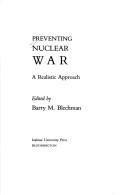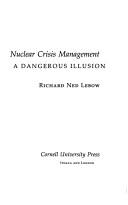| Listing 1 - 10 of 121 | << page >> |
Sort by
|

ISBN: 0253203503 Year: 1985 Publisher: Bloomington (Ind.) : Indiana university press,
Abstract | Keywords | Export | Availability | Bookmark
 Loading...
Loading...Choose an application
- Reference Manager
- EndNote
- RefWorks (Direct export to RefWorks)
Book
Year: 2003 Publisher: Paris : Presses de Sciences Po (P.F.N.S.P.),
Abstract | Keywords | Export | Availability | Bookmark
 Loading...
Loading...Choose an application
- Reference Manager
- EndNote
- RefWorks (Direct export to RefWorks)
Les risques nucléaires sont de nature sanitaire, écologique, économique et stratégique. Universels et spécifiques, n'ayant jusqu'à présent pas trouvé de réponse politique, ils créent des “communautés de la peur”. Ce livre examine, dans une “société du risque”, les liens entre le risque et la peur ou encore entre risque et politique, ainsi que les changements intervenus depuis la fin de la guerre froide. Il insiste sur la nécessité d'insuffler un peu de démocratie dans la réflexion sur l'acceptation de ce risque.
Book
Year: 1991 Publisher: Santa Monica, CA : RAND Corporation,
Abstract | Keywords | Export | Availability | Bookmark
 Loading...
Loading...Choose an application
- Reference Manager
- EndNote
- RefWorks (Direct export to RefWorks)
This report documents the results of a conference on Military Operations and Crisis Management, held at RAND in January 1990 to explore issues concerning the use of military force in crises. The conference brought together active-duty and retired military officers, analysts, academic experts, and policy officials. Together they examined the constraints on and special requirements for force employment in crises that potentially involve the superpowers in a nuclear escalation. Tension can arise between the conflicting logics and imperatives of force and diplomacy when two nuclear-armed superpowers seek to have a war without shooting at each other. The logic of force employment in crisis thus differs from that in war. Conference participants concluded that the political signal that might be intended by the manipulation of military forces may not be understood by the adversary. Political leaders must understand the possible costs and risks in military terms of actions taken with military forces. Military leaders, on the other hand, must recognize the nature of the crisis management challenge to political leaders. Finally, political leaders must communicate their objectives clearly to those in charge of implementing them.
Book
ISBN: 1349127345 Year: 1992 Publisher: Houndmills, Basingstoke, Hampshire ; London : Macmillan,
Abstract | Keywords | Export | Availability | Bookmark
 Loading...
Loading...Choose an application
- Reference Manager
- EndNote
- RefWorks (Direct export to RefWorks)
The de-escalation of a nuclear crisis is one of the major issues facing humankind. This book examines how nations in crises might successfully move back from the brink of nuclear war and how confidence-building measures might help and hinder the de-escalatory process.

ISBN: 0801419891 Year: 1987 Publisher: Ithaca, NY : Cornell University Press,
Abstract | Keywords | Export | Availability | Bookmark
 Loading...
Loading...Choose an application
- Reference Manager
- EndNote
- RefWorks (Direct export to RefWorks)
NUCLEAR CRISIS CONTROL--USA --- NUCLEAR CRISIS CONTROL--USSR
Book
Abstract | Keywords | Export | Availability | Bookmark
 Loading...
Loading...Choose an application
- Reference Manager
- EndNote
- RefWorks (Direct export to RefWorks)
The World Health Organization's publication 'National Stockpiles for Radiological and Nuclear Emergencies: Policy Advice' provides comprehensive guidelines and policy advice on managing national stockpiles for emergencies involving radiological and nuclear incidents. It covers topics such as the health effects of radiation, the creation and management of stockpiles, and the roles of stakeholders and organizations in emergency preparedness. The book also addresses the cost and logistics of maintaining stockpiles, as well as research into therapies for radiation injuries. This publication is intended for policymakers, healthcare professionals, and emergency management personnel, aiming to enhance preparedness and response strategies at a national level.
Emergency management. --- Nuclear crisis control. --- Emergency management --- Nuclear crisis control
Book
Year: 1987 Publisher: Ithaca, NY : Cornell University Press,
Abstract | Keywords | Export | Availability | Bookmark
 Loading...
Loading...Choose an application
- Reference Manager
- EndNote
- RefWorks (Direct export to RefWorks)
Book
ISBN: 0908601565 Year: 1987 Publisher: Wellington New Zealand planning council
Abstract | Keywords | Export | Availability | Bookmark
 Loading...
Loading...Choose an application
- Reference Manager
- EndNote
- RefWorks (Direct export to RefWorks)
Study on the effects of nuclear war and its consequences of New Zealand politics, security, ecology, radiation, health, food.
Nuclear crisis control --- Nuclear warfare --- Environmental aspects
Book
ISBN: 153611894X 9781536118940 9781536118605 Year: 2017 Publisher: Hauppauge, New York
Abstract | Keywords | Export | Availability | Bookmark
 Loading...
Loading...Choose an application
- Reference Manager
- EndNote
- RefWorks (Direct export to RefWorks)
Nuclear weapons. --- Nuclear crisis control. --- Nuclear disarmament.
Book
ISBN: 0819163368 Year: 1987 Publisher: Lanham, MD : University Press of America,
Abstract | Keywords | Export | Availability | Bookmark
 Loading...
Loading...Choose an application
- Reference Manager
- EndNote
- RefWorks (Direct export to RefWorks)
| Listing 1 - 10 of 121 | << page >> |
Sort by
|

 Search
Search Feedback
Feedback About UniCat
About UniCat  Help
Help News
News